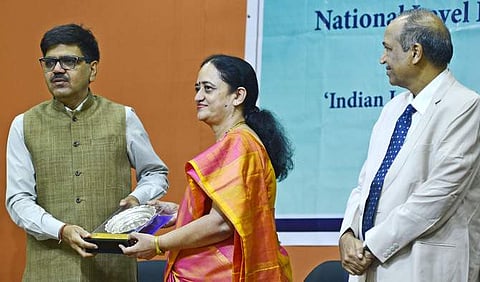

The National Assessment and Accreditation Council (NAAC) grades and National Institutional Ranking Framework (NIRF) rankings are "meaningless" and are not the only good markers of quality education, said Former Vice-Chairman of the University Grants Commission, Dr H Devaraj while speaking at the National Level Education Administrators Conclave at the MOP Vaishnav College For Women in Chennai. The central theme of the Conclave was to discuss the way forward for the Indian institutions to be included in the list of top 200 institutions worldwide.
In a startlingly candid statement, Dr Devaraj said that Prime Minister Narendra Modi had also asked him about the NAAC grades and he had to reply honestly. "He asked me if I could compare Amity University with Jawaharlal Nehru University — both have the same NAAC grade. But they are not on par. I had to say the fact. Recognition should come from the people. NIRF is also meaningless," he said and emphasised that each institution should develop its brand equity. Devaraj had served as NAAC Chairman in 2014-15.
He asked Mangat Ram Sharma, Principal Secretary of the Tamil Nadu Higher Education Department, who was also present at the inaugural session, to make sure that only good teachers are selected. "I think we need to change the selection process. Everywhere I go, across the country, they (institutions) show me the gadgets they use or the AC rooms and hi-tech additions they have made recently. But they don't show me the human resource — the teacher, who is an important component of the education system and is going to be there for the next 30 years. If we make one mistake (in selecting the right teacher) now it will reflect in the next 30 generations," said the professor who was the Head of the Department of Biotechnology at University of Madras before he joined as the Vice-Chairman of the UGC.
He emphasised the need for teachers and students to bond over their academics as the way to effective learning, "The teachers need to connect with the students — not just the toppers but with the backbenchers as well. There is something called the focal length of the students. A teacher needs to recognise that and help the students focus better. A teacher is a permanent student who needs to learn their entire life," he added.
Mangat Ram Sharma too, while delivering his keynote address, agreed that the quality of teachers in a large number of higher education institutions is "pathetic". "When we were promoting people for the Career Advancement Scheme of the UGC, most of the associate or assistant professors would come with bulky reports but had no publications in good journals. We are trying to bring a system into force that will allow the VCs and academicians to select the teachers instead of the teacher recruitment board, which is in itself a low-profile committee," he said. "We have the numbers when it comes to universities. We need to enhance their quality — the good mixture of our conservative value standards with modern technology. Autonomous institutions like MOP Vaishnav show that it definitely pays off. Whenever we sit down for a meeting with VCs they always say that autonomy is good. And we agree. But as the head of the institutions are they giving their faculty that autonomy? No. Even for a project approved by the UGC or the DST has to be cleared by the VC. That has to change. Lack of internal autonomy can kill creativity as well," said Sharma. He also added that we need younger VCs to connect better with the Gen-Y and understand their requirements better.
